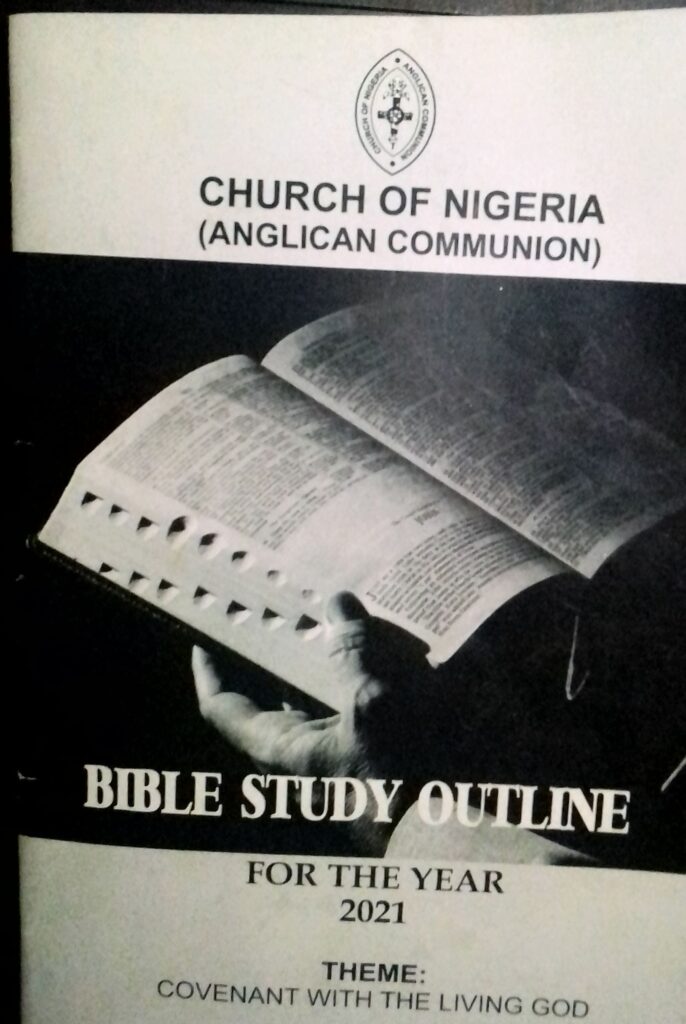Search Contents
2021 Anglican Bible Study outline Igbo/English Study 13
This is English and Igbo versions of the 2021 Anglican Bible study “Covenant with the living God” outline. You may download the app here on your phone to have the outline for the year complete. 2021 Anglican Bible Study outline Igbo/English Study 13.
STUDY 13
Palm Sunday, March 28, 2021
THEME: COVENANT WITH THE LIVING GOD
SUB-THEME 3: God’s covenant with man-(6)
TOPIC: Mosaic Covenant
TEXTS: Exod. 31:12-18; Deut. 4: 12-15
AIMS:
i. to identify the Mosaic Covenant and its biblical components
ii. to learn from Jesus’ humility and sacrificial love and
iii. to expose why the Mosaic Covenant had to be replaced with the New covenant
INTRODUCTION: As we celebrate Palm Sunday today marking the triumphant entry of Jesus
into Jerusalem, let us in humility submit to His Lordship in our covenant relationship with Him.
The Mosaic Covenant is God’s Covenant with Israel at Horeb-Sinai through Moses. Its
establishment (Exod. 19: 5-6) constituted the formal basis for the redemptive relationship
between the Lord and His chosen people until it was superseded by the new covenant (Heb. 8:
3). What then are the signs and significance of this old covenant and why is there a need for the
new one?
STUDY GUIDE:
The Mosaic Covenant sign is the Sabbath (Exod. 31:13,16-17) and based on Israel’s pledge to
obey the Lord (Exod. 19:8;24:3,7) Moses sprinkled the “blood of the covenant” on them (Exod.
24: 8).
1. How do you understand the Mosaic Covenant and its signs? Exod. 31:12-18; Deut. 4: 12-
15 (for further studies see Exod. 20: 1-17 on the 10 commandments)
2. What are the blessings attached to the Mosaic covenant? Exod. 19: 3-6; Deut. 26:18
3. What is significant about replacing the Mosaic (Old) Covenant with the new Covenant?
Jer. 31: 31-34; Heb. 8: 7-13, 18.
4. As Christians, what can we learn from the humility of Moses and that of Christ, being the
essence of marking the Palm Sunday? Num 12:3-7; Phil. 2: 5-11; Jam. 4: 6-10
CONCLUSION: The Mosaic Covenant conferred on the Israelites the honor of being God’s
treasured possession, a kingdom of priests, and a holy nation. The replacement of the Mosaic
Covenant with the New had granted all believers in Christ Jesus the priesthood of all believers
and the inheritance of God’s eternal kingdom. Let us, therefore, purge our hearts from all that will
rob us of the blessings of the New Covenant.
FOOD FOR THOUGHT: Do you know obedience is basic to enjoying God’s covenant
blessings.
MEMORY VERSE: Exod. 19: 5 “Now therefore, if you will indeed obey My voice and keep
My covenant, then you shall be a special treasure to Me above all people; for all the earth is
Mine.”
2021 Anglican Bible Study outline Igbo/English Study 13
Igbo Version
IHE ỌMỤMỤ 13
SỌNDE IGU NKWỤ Maachi. 28, 2021
ISI OKWU NCHỊKỌTA: Ọgbụgba Ndụ anyị na Chineke Ukwu Dị Ndụ
ISI OKWU NTA 3: Ọgbụgba Ndụ Chukwu na Madụ (6)
ISI OKWU: Ọgbụgba Ndụ nke “Mozayik” (gbasara Moses na ụmụ Israel)
IHE ỌGỤGỤ AKWUKWỌ NSỌ: Ọpụpụ 31: 12-18; Deut. 4:12-15
EBUM N’OBI ỌMỤMỤ IHE
- Igosiputa ihe pụru iche na Ọgbugba ndụ Chukwu na Moses na Ụmụ Israel, na ebe Akwụkwo nsọ siri kwado ya.
- Ka anyị nwee ike ịmuta na mweda n’ala ndụ nke Jisos na ihunanya ya nenweghị atụ.
- Iji kọwaa ihe mere Ọgbugba ndụ nke Mozis na umu Israel bụzi ihe aga-eji Ọguga ọhụu were nọchie.
NKỌWA OKWU: Dịka anyi na-eme emume Ụka Igu Nkwụ n’ụbochi taa, nke na-egosiputa mbata Jizos batara Jerusalem n’ike n’ebube dịka Onye Eze, kaanyi were mweda n’ala rubere Onye nweanyi Jizos isin’ime Ọgbụgba ndụ dị nsọ.
Ọgbugba ndụ nke “Mozayik” bu Ọgbugba ndụ nke Chukwu na Moses na umu Israel nke emere n’Ugwu Horeb-Sinai, mgbe Moses bu onye ndu umu Israel. Nhiwe ogbugba ndu a (Ọpụpụ 19:3-6) butere ụzọ dị saraa maka ọlu nzọpụta nke Chukwu kwadooro ndị nke Ya, ndi aroputara. Nke a bụ ntọ-ala nke Ogbugba ndụ ọhụu, nke ga-anọchi Ogbugba ndụ nke mbụ. (Ndi Hibru 8:3).
Kedu ihe iriba ama na ihe ngosi nke Ogbugba ndụ ochie, nke mere ka Ogbụgba ndụ ohuu dị oke mkpa?
IHE OMUME
Ihe ngosiputa nke Ọgbugba ndu nke, Chukwu na Moses na Umu Israel bụ emenme Sabbath (Ọpupu 31: 13, 16-17) nke gbakwasiri ụkwụ na nkwekọrịta nke umu Israel irubere Jehovah isi (Ọpupu 19:8;24:3,7). N’ihi nke a, Moses were “ọbara Ogbugba ndu ahu” were fekwasi umu Israel (Ọpupu 24:8).
- Kọwaa Ọgbụgba ndụ nke Mozayik na ihe ngosi na ihe iriba ama ya. (Ọpupu 31:12-18; Deut 4:12-15). Gụkwaa ebe ndị a – Ọpupu 20:1-17 nke na-akọ maka iwu iri Chineke Umu Isreal, na umu mmadụ.
- Kedu ngọzi di iche iche nke sitere n’Ọgbugba ndụ nke Mozayik? (Ọpupu 19:3-6; Deut. 26:18).
- Kedu nnukwu ihe putara ihe n’iji ogbugba ndu ohụụ mechie ogbugba ndu nke Mozayik (nke ochie)? (Jere 31:31-34; Ndi Hibru 8:7-13, 18)
- Dika ndị nke Kraist, kedu ihe anyi na-amụta na mweda n’ala Moses, na nke “Kraist”, nke bụ ihe ịriba ama nke anyị ji eme emenme nke Ụka Igu Nkwụ? (Ọnụ Ogugu 12:3-7; Ndi Filip 2:5-11; Jemes 4:6-10).
NCHỊKỌTA OKWU: Ọgbugba ndu nke Mozayik bụ nke nyere umu Israel ebube, nke ibụ ndị nke Chineke hụru n’anya n’ụzo puru iche, burukwa mba nke ndi nso etere mmanu. Ma mgbe Ọgbugba ndu nke ọhuu were ọnodụ site n’inochi nke ochie (Mozayik), nke a nyere ndi nke Kraist n’uwa niile ohere ị bụ ndi nchụaja e tere mmanụ, bụkwara ndi nketa nke alaeze ebighebi nke Chineke. Ka anyi jisie ike nyuchaa obi anyina-ewepụ ihe o bula ga-eme ka anyi ghara inweta ngozi nke Ọgbugba ndu ohụụ a.
OKWU IBU N’UCHE: Ị mara na nrube isi na mweda n’ala bụ ihe dịchasiri oke mkpa n’inweta elele nke ngọzi Ọgbugba ndụ nke chineke?
IHE ỌGỤGỤ IBU N’UCHE: Ọpụpụ 19:5. – “Ma ugbu a, ọ bụrụ na unu ga-ege ntị n’olu m n’ezie, ọ burukwa na unu edebe Ọgbugba Ndụ m, unu ga-aburukwara m ihe nke aka m karia ndi niile: n’ihi na ọ bụ mụ nwe ụwa niile ”.




